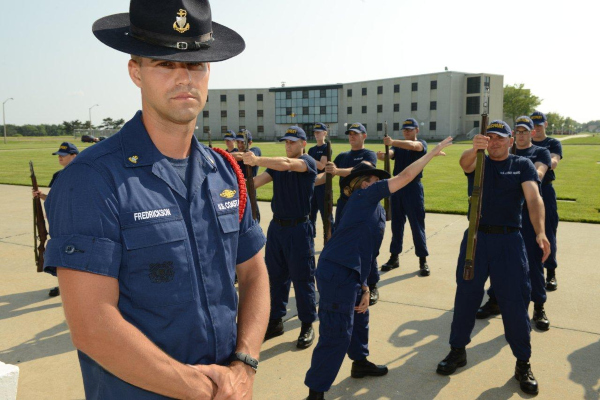The United States Coast Guard protects maritime activities and provides search and rescue operations.
Serving the USCG is an opportunity that anyone thinking about joining the military should consider, especially if you like water and living near the coast.
However, before you get too far you’ll need to pass Coast Guard basic training.
Here is your ultimate survival guide…
Related Article: How To Join The Coast Guard
Table of Contents
1. Coast Guard Basic Training Overview
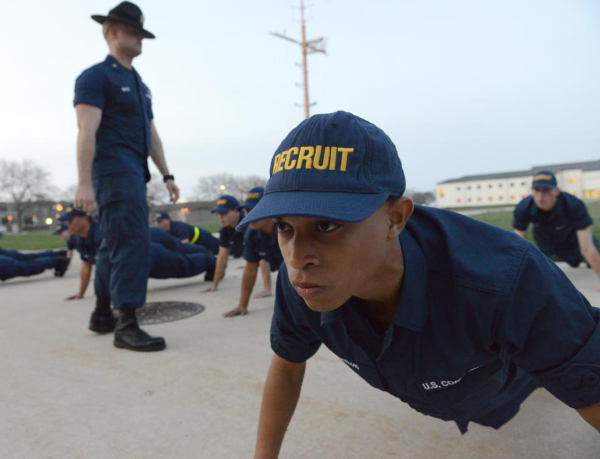
The Coast Guard functions as the coastal defense, search and rescue, and maritime law enforcement for the United States.
The President of the United States can (and has) also deploy the Coast Guard as support for the U.S. Navy during times of war.
However, seeing combat is unlikely and most service members of the Coast Guard spend their duty inside the United States.
The U.S. Coast Guard has basic training, or boot camp, like any other military branch.
Basic training lasts eight weeks at the Coast Guard Training Center in Cape May, New Jersey.
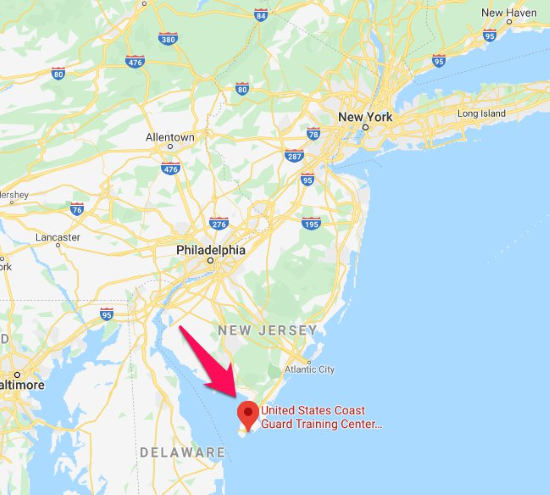
The Coast Guard is like the U.S. Air Force and Navy with only one training location for boot camp.
Therefore, male and female recruits train together under the same training regime (more information on that below).
Coast Guard basic training lasts approximately eight weeks (53 days in total).
The rigorous boot camp is different from other branches yet with some similarities.
Basic training is divided between building physical endurance, developing crucial skills of the USCG, and gaining knowledge for your rating.
Recruits arrive at Camp May and spend the first few days at Sexton Hall for processing.
Prospective Coast Guardsmen get assigned a temporary company commander during initial processing.
Temporary company commanders teach new recruits the basics of the U.S. Guard prior to being introduced to their permanent company commanders.
Though Coast Guard basic training is demanding, you can succeed and become an official Coast Guardsman by preparing for the challenging course.
2. U.S. Coast Guard Core Values
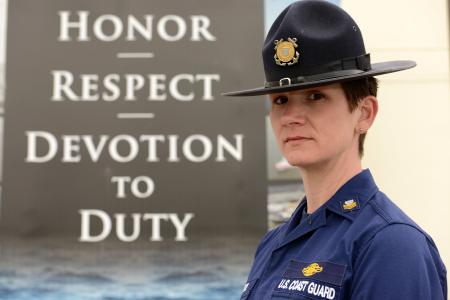
The core values of Coast Guard boot camp are teaching honor, respect, and devotion to duty.
USCG Recruit Training Objectives include:
- Self-Discipline
- Military Skills
- Marksmanship
- Military Bearing
- Water Survival
- Esprit de corps (Morale)
- Physical Fitness and Wellness
- Vocational Skills and Academics
The eight week USCG training schedule includes time spent learning teamwork and developing physical fitness.
The U.S. Coast Guard will also introduce you to how the military branch operates and your role within the branch.
3. Basic Training Schedule
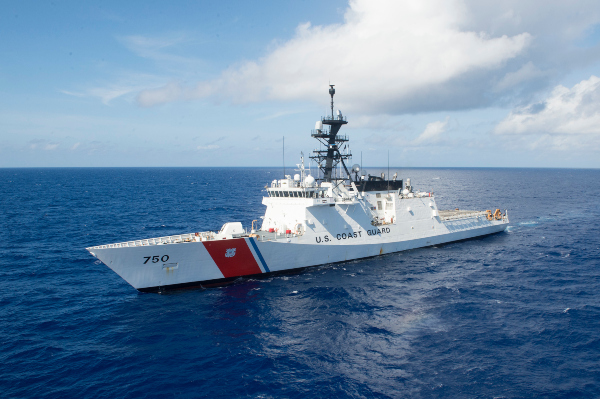
As we mentioned earlier, Coast Guard basic training lasts 53 days.
As a result, boot camp is divided into eight weeks of training with various levels of education and preparation for the U.S. Coast Guard.
Recruits arrive at Cape May and begin the experience at Sexton Hall which processes new members.
The first few days of boot camp involve very little training but basics like an orientation, haircuts, paperwork, and receiving uniforms.
Medical and dental exams are necessary to make sure you are physical ready and capable to serve the military.
Recruits receive a personal copy of The Helmsman which contains everything you need to know about becoming a Coast Guardsman.
A Company Commander (CC) is assigned to serve as your instructor, mentor, and coach.
You also need to undergo an entry-level physical fitness test to make sure you are fit enough for service.
Men and women must meet the minimum qualifications for physical fitness in the Coast Guard:
| Activity | Men | Women |
|---|---|---|
| Push-Ups (60 Secs) | 29 | 15 |
| Sit-Ups (60 Secs) | 38 | 32 |
| 1.5 Mile Run | 12:51 | 15:26 |
| Sit and Reach | 16.50" | 19.29" |
| Tread Water | 5 minutes | 5 minutes |
Additionally, recruits need to complete a swim circuit as part of their physical fitness standards.
The Coast Guard also requires you to jump off a 6-foot platform and swim 100 meters.
Related Article – Coast Guard PT Test Standards: PFT Requirements For 2020
Week One
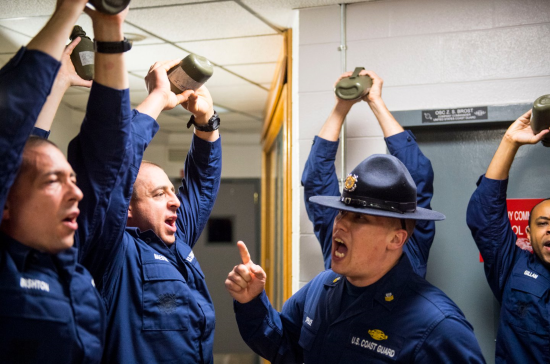
The first few days of Coast Guard boot camp is fairly boring with long days of examinations and paperwork.
The second half of the first week gets more demanding and intense.
Expect to get an earful from your company commander grilling you anytime you make a mistake.
The days start at 0530 (5:30 am) with a tightly enforced curfew of 2200 (10:00 pm).
You’ll have very little free time and when that is the case your CC expects you to read The Helmsman.
Company Commanders drill recruits hard during the first week and tests your physical fitness level to make sure you have what it takes for service.
Stay strong mentally and focus on the task at hand (don’t give up!).
Company Commanders may attempt to threaten to revert you back to another company several weeks behind your current unit if you fail.
You can also receive demerits for doing something wrong which the Coast Guard defines as “performance indicators”.
You’re not perfect and will make some mistakes but as long as you remain disciplined and work hard you’ll survive week one.
Week Two
The training at USCG boot camp picks up during week two.
Training consists of early morning workouts and a swim assessment.
Recruits also get to meet a Company Mentor who serves more like a friend than the Company Commander.
The Company Mentor is an active-duty Coast Guardsman who is currently in the fleet and spends time with the company throughout boot camp offering advice.
Spend time with the Company Mentor and listen closely to the advice they have to give about the military branch.
Secondly, recruits get introduced to classroom studies during week two.
Classroom learning includes everything from the basics of seamanship to information about the GI Bill.
Week Three
While week three is physically challenging the emphasis is primarily on classroom learning.
The Coast Guard introduces Helmsmen to drill during week three so they learn how to work on a team.
Along with information relevant to serving the Coast Guard, you also learn about concepts like the Freedom of Information Act.
One thing recruits love about week three is getting introduced to the 9mm handgun.
The Coast Guard only allows recruits to fire a 9mm handgun compared to other branches that use an M-16 rifle.
Week Four
The Coast Guard allows recruits to fire a 9mm handgun for the first time during week four.
It’s an exciting time during boot camp which otherwise represents a difficult week of training.
The Coast Guard test recruits to meet the physical fitness standards of the military branch (see table above).
You also need to study and pass midterm exams.
Recruits that fail to pass the physical fitness test need additional training and must try again in week seven.
If you fail to pass the physical fitness test a second time you could be held in boot camp for 12 weeks.
Furthermore, recruits get more information on the various Coast Guard ratings (or jobs), pay and allowances, and other career planning.
Your performance on the midterms assists the Coast Guard with determining where you’ll get assigned.
After you pass midterms you can request a geographical location and operations assignment.
If you fail midterms, the Coast Guard allows you with one re-test.
Those that fail the retest must get “rephased” to try boot camp once again from the beginning of the process.
The conclusion of the fourth week includes a celebration where the company earns its colors.
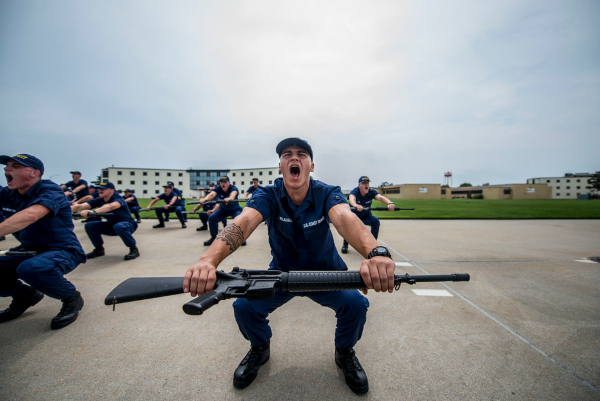
Week Five
Recruits have a brief sigh of relief following the Coast Guard PT test and midterms of week four.
Consequently, most Coast Guard recruits feel fairly comfortable by week five yet the demands do not end there.
You are only halfway through basic training and need to stay focused to complete the second half of duties.
Drill rehearsal is a major focus of the fifth week.
As a result, the Coast Guard assigns you a dress uniform as well as prepares for graduation events to serve as motivation to complete boot camp.
You’ll also learn about lines, knots, seamanship, fire prevention, deck maintenance, and other skills needed on vessels.
Recruits also learn about survival equipment and personal floatation devices.
Emergency drills and equipment, along with handling flags and pennants are offered.
The end of the week presents you with your first duty station.
It’s up to you to contact the new post and begin preparations for your relocation following graduation from Coast Guard basic training.
Week Six
Firearms training is a big emphasis in week six of boot camp.
The Coast Guard teaches you how to properly shoot a gun and correct safety handling.
Recruits also get more time on the range learning the marksmanship of the 9mm handgun.
There is also education on fire prevention, firefighting, and watch standing.
Career counseling is available to prepare travel plans and other details for after graduation of boot camp.
Week Seven
Helmsmen are getting close by the time of week seven.
However, you need to pass the final exam before you finally get to the end of boot camp.
The USCG wants to ensure that you are ready to enter the fleet and execute your Coast Guard rating.
Additionally, if you did not have the chance to pass the physical fitness test you’ll get a second opportunity during week seven.
The Coast Guard wants you to turn in your gear and prep for graduation after you pass the necessary exams.
A final reward is an eight-hour pass from the base if you haven’t racked up any performance indicators.
Week Eight
While the first seven weeks of Coast Guard boot camp are stressful the last week is exciting.
The last few days at Coast Guard basic training feature some final details of your first permanent duty assignment.
You’ll fill out some paperwork and prepare for your departure after graduation.
Family and friends are welcome to attend the graduation ceremony and are worth inviting for the special moment.
Recruits march on Friday morning as part of a parade before settling for the official graduation ceremony.
The Coast Guard hands out awards during the ceremony including ribbons for the top 3% from the graduating company.
Recruits also receive individual awards for achievements like best in academics, seamanship, pistol expert fire, leadership, and physical fitness.
After becoming an official U.S. Coast Guardsman, newly appointed members are free to depart from Cape May.
The Coast Guard is different from other military branches in that out-processing is done before the ceremony.
Related Article – Coast Guard Rescue Swimmer: Pay, School, Training, And More
4. Coast Guard Basic Training Packing List
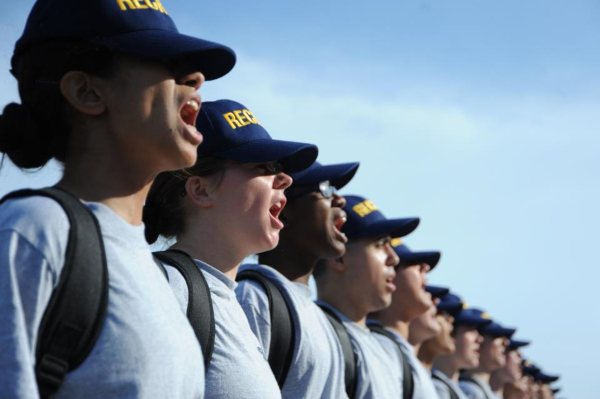
Coast Guard basic training is demanding enough with the right gear and essentials.
The military branch has rules like everyone else so make sure you follow the rules and guidelines to avoid getting in trouble.
Male and female recruits have different needs and should adjust accordingly.
Keep in mind that over-the-counter and prescription medications are not allowed at USCG boot camp.
The only exception is birth control which women may bring three months’ worth of medication yet will get evaluated by a military doctor.
Any items that are not permitted will be confiscated and returned after graduating from the program.
You should bring the following:
- Underwear (6-10 pairs)
- White V-neck shirts
- Toothbrush and toothpaste
- Non-electric razor
- Cell phone and charger
- Unframed pictures
- Watch
- Address book with stationery and stamps
- $50 in cash for the Exchange
Women may also bring the following:
- Neutral-colored hair ties
- Feminine products
- Sports bras
- Shampoo/conditioner
You can review a full list of items the Coast Guard allows you to take to basic training here.
The Coast Guard provides the following at boot camp:
- Floss
- Shower Kit (shampoo, soap, deodorant, shaving cream)
- Towels and washcloth
- Shower shoes
- Laundry bags
- Running shoes and socks
- Men athletic supporters
- Uniforms
- Notebook and pens
- Sunscreen and insect repellent
Avoid bringing the following items to Coast Guard basic training:
- Alcohol
- Food and beverages
- Glass containers
- Pornographic materials
- Narcotics and drug paraphernalia
- Tobacco products
- Magazines and newspapers
- Weapons
- Supplements
Related Article: Military Banned Supplements List For 2020
Frequently Asked Questions (FAQ)
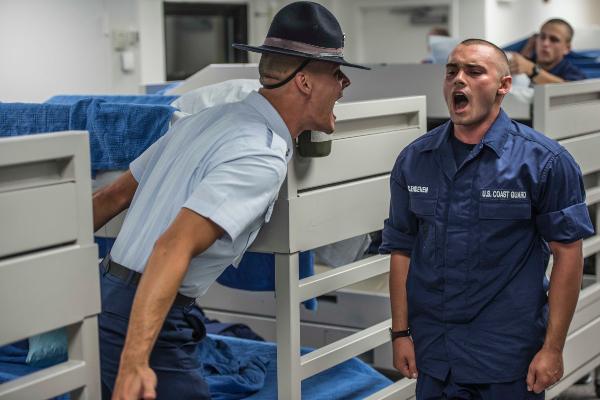
Here are some frequently asked questions about Coast Guard basic training…
Related Article – Coast Guard Jobs List: A List Of All Ratings In The Coast Guard
5. How hard is Coast Guard basic training?
Coast Guard basic training is intense and challenging like every other branch of the military.
It’s difficult to say one type of military service basic training is harder than the other branch.
However, many agree that Coast Guard boot camp ranks among the most demanding, especially because of the swimming elements.
Therefore, USCG basic training is similar to Marines boot camp because of the swimming and diving regime.
Some argue that Coast Guard basic training is among the toughest boot camps in the U.S. Armed Forces.
6. How should I prepare for basic training?
First, you need to make sure that serving the military (particularly in the USCG) is the right decision for your future.
Secondly, you need to prepare physically and mentally for boot camp.
Coast Guard basic training features physical fitness standards you need to meet for qualification.
You also need to pass a medical exam and demonstrate to the military branch that you are mentally competent for service.
Avoid bringing anything to basic training that the Coast Guard will confiscate.
It’s also a great idea to set up a bank account (if you haven’t already done so) because military pay is made through a direct deposit.
Do not bring alcohol, illegal substances, or anything else that might get you in trouble.
Recruits are allowed to bring a cell phone yet can only make calls on Sundays of the final two weeks of training.
Notify family and friends that they may only hear from you by letter/postcard during this time period.
Learning to swim at an expert level is crucial to the U.S. Coast Guard so make sure you have experience beforehand.
Lastly, over-the-counter medication is not allowed at boot camp and prescription medications require approval.
Here is an effective 30-day workout plan to prepare for basic training.
7. What percentage of recruits make it through boot camp?
There isn’t a lot of reporting on the attrition rate for the U.S. Coast Guard.
However, the Army, Marine Corps, and Navy all have roughly the same drop out rate (11-14%).
The reason for dropping out of basic training ranges from medical reasons to failing to pass the physical fitness test.
8. What happens if I fail?
The U.S. Coast Guard presents recruits with two opportunities to pass the physical fitness test.
Recruits also have two opportunities to pass the final exam.
Failing to pass the PT test a second time will likely result in you getting “rephased” to an earlier stage of boot camp to try and achieve the necessary fitness qualifications.
If you work hard, listen to the instructions, and stay focused during testing periods you should be able to pass the tests without stressing too hard.
9. Will I get paid during basic training?
Yes, you get paid the moment you arrive at basic training.
It’s important to establish a bank account (if you don’t already have one) prior to leaving for boot camp.
The Coast Guard uses a direct deposit to pay you so it’s the best and quickest way to access your funds.
Recruits are generally paid at the E-1 (Seaman Recruit) ranking.
Related Article – Coast Guard Ranks and Pay
10. What happens after basic?
The Coast Guard is different from other military branches in that out-processing is completed prior to the graduation ceremony.
Therefore, you have the freedom to leave Cape May immediately after graduation.
During the second half of USCG boot camp, you will receive your first assignment and duty station.
By the time of graduation, you should have already made your travel arrangements for getting to your first assignment.
Recruits have five days of leave with family and friends before they must report to their first assignment.
11. What types of jobs would I have?
The U.S. Coast Guard defines its military jobs as “ratings”.
There are currently 24 different ratings in the Coast Guard.
Here is an overview of all the different military careers in the USCG.
12. Where will I be based once all training is complete?
Recruits have the opportunity to request a rating and location during boot camp.
The Coast Guard will make every attempt to fulfill your request yet nothing is guaranteed.
You’ll learn about your first permanent duty assignment halfway through basic training.
It allows you enough time to make travel arrangements and figure out housing before you leave boot camp.
Here is a list of all the possible Coast Guard bases for assignment.
Conclusion
Coast Guard basic training is among the most difficult boot camps in the U.S. Armed Forces to survive.
USCG basic training combines the usual difficulties of boot camp with the added challenge of swimming and diving.
Prepare for boot camp by getting into shape, learning more about the culture of the branch, and asking lots of questions to your local recruiter.
- Ikon Pass Military Discount: Learn How To Save Big - January 31, 2025
- RTIC Military Discount: Find Out How To Save Big on Gear - January 30, 2025
- Traeger Military Discount: Learn How To Save Big on Smokers - January 28, 2025

